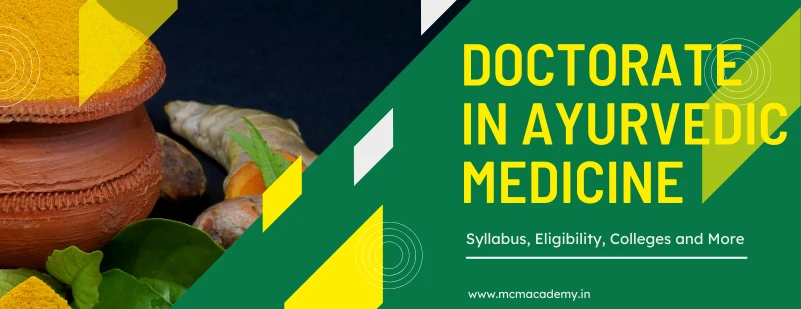Ayurveda, one of the world’s oldest healing systems, is gaining recognition across the globe for its holistic approach to health. With the rise of integrative medicine and natural therapies, research in Ayurveda has become more significant than ever. For students and professionals who wish to contribute to this ancient science at the highest academic and clinical level, a Doctorate in Ayurvedic Medicine is a prestigious and impactful choice.
In this blog, we will cover everything you need to know about pursuing a Doctorate in Ayurvedic Medicine from eligibility, top universities, syllabus, admission process, career opportunities, salary, and future scope.
Table of Contents
What is a Doctorate in Ayurvedic Medicine?
A Doctorate in Ayurvedic Medicine (often referred to as a PhD in Ayurveda) is the highest academic degree in the field of Ayurveda. It focuses on advanced research, in-depth study of Ayurvedic classics, clinical application, and integration with modern scientific methods.
Unlike a Master’s degree in Ayurveda (MD Ayurveda), which emphasizes clinical practice and advanced learning, the Doctorate program primarily focuses on original research, thesis writing, and contributing new insights to Ayurvedic science.
Who should pursue it?
- Ayurvedic doctors seeking research careers.
- Academicians aspiring to become professors or deans.
- Professionals interested in integrative healthcare.
- Those passionate about validating Ayurveda through scientific evidence.
Eligibility Criteria
To apply for a Doctorate in Ayurvedic Medicine, candidates must meet the following requirements:
| Criteria | Details |
|---|---|
| Educational Qualification | BAMS + MD Ayurveda / MSc Ayurveda or equivalent recognized degree |
| Minimum Marks | Usually 55% (50% for reserved categories) |
| Entrance Exams | Some universities conduct their own entrance tests + interview |
| Experience | Clinical or research experience preferred |
Note: In certain universities, candidates from allied sciences (Biochemistry, Pharmacology, Botany, or MBBS with interest in Ayurveda research) may also be eligible.
Duration of the Program
The Doctorate in Ayurvedic Medicine typically takes 3–5 years to complete.
Program Structure:
- Coursework (1 year): Research methodology, biostatistics, advanced Ayurveda studies.
- Research Proposal & Approval: Submission of a detailed research plan.
- Thesis Research (2–3 years): Clinical trials, experimental studies, or textual research.
- Thesis Submission & Viva Voce.
For working professionals, some universities allow part-time PhD in Ayurveda, extending up to 6 years.
Curriculum & Specializations
The curriculum is research-oriented but also covers advanced Ayurvedic studies and interdisciplinary subjects.
Core Areas of Study:
- Research methodology & biostatistics
- Clinical trials in Ayurveda
- Ayurveda classics (Charaka Samhita, Sushruta Samhita, Ashtanga Hridaya)
- Scientific validation of Ayurvedic principles
- Modern lab techniques applied to Ayurveda
Popular Specializations:
| Specialization | Focus Area |
|---|---|
| Dravyaguna | Ayurvedic pharmacology of medicinal plants |
| Rasashastra & Bhaishajya Kalpana | Herbal-mineral formulations, drug development |
| Kayachikitsa | Internal medicine |
| Panchakarma | Detoxification & rejuvenation therapies |
| Kaumarbhritya | Pediatrics in Ayurveda |
| Shalya Tantra | Ayurvedic surgical methods |
| Swasthavritta | Preventive & social medicine |
Students may also conduct interdisciplinary research—such as Ayurveda & pharmacognosy, Ayurveda & modern pharmacology, Ayurveda & nutrition.
Admission Process
The admission procedure for a Doctorate in Ayurvedic Medicine varies by university, but the general steps include:
- Application Submission: Online/offline with academic transcripts.
- Entrance Examination: Some universities conduct tests covering Ayurveda knowledge & research aptitude.
- Research Proposal Submission: A tentative idea of your doctoral research.
- Personal Interview: To assess interest, feasibility of research, and supervisor availability.
- Final Selection: Based on merit + performance.
Top Institutions Offering Doctorate in Ayurvedic Medicine
In India
| University/Institute | Location | Recognition |
|---|---|---|
| Banaras Hindu University (BHU) | Varanasi | UGC, CCIM |
| Gujarat Ayurved University | Jamnagar | International collaborations |
| National Institute of Ayurveda (NIA) | Jaipur | Ministry of AYUSH |
| Institute of Post Graduate Teaching & Research in Ayurveda (IPGT & RA) | Jamnagar | Research-focused |
| Kerala University of Health Sciences | Kerala | State-recognized |
International (Ayurveda-focused PhD Programs)
- University of Westminster, UK (Ayurveda & Integrative Health Research)
- Middlesex University, UK (Traditional Medicine research)
- Bastyr University, USA (Ayurvedic sciences research collaborations)
Tip: Always check for UGC, CCIM, or Ministry of AYUSH recognition to ensure global validity.
Skills You Develop During the Program
Pursuing a Doctorate in Ayurvedic Medicine equips you with:
- Research expertise (clinical, laboratory, textual research).
- Analytical skills to validate Ayurvedic therapies.
- Academic skills (teaching, mentoring students, writing scientific papers).
- Clinical excellence in specialized Ayurvedic treatments.
- Interdisciplinary approach (integration with modern science).
Career Opportunities After Doctorate in Ayurvedic Medicine
Graduates of this program enjoy a wide range of career options both in India and abroad.
| Career Path | Roles & Opportunities |
|---|---|
| Academics | Professor, Dean, Research Supervisor in Ayurveda colleges |
| Clinical Practice | Senior Ayurvedic Consultant, Specialist Physician |
| Research & Development | Herbal medicine research, pharmaceutical R&D, nutraceuticals |
| Government Roles | Positions in AYUSH ministry, WHO research collaborations |
| International Careers | Integrative medicine centers, wellness resorts, global Ayurveda promotion |
| Entrepreneurship | Starting Ayurvedic hospitals, wellness centers, or product lines |
Salary & Scope
The salary of a PhD-holder in Ayurveda depends on the career path chosen.
| Career Field | Average Salary (India) | Average Salary (Abroad) |
|---|---|---|
| Academic Professor | ₹8–15 LPA | $70,000–$100,000 per year |
| Research Scientist | ₹10–20 LPA | $80,000+ per year |
| Ayurvedic Consultant | ₹12–18 LPA | $100–150 per consultation (USA/Europe) |
| Pharma/Nutraceutical Industry | ₹10–25 LPA | $90,000–$120,000 per year |
Scope Abroad: Ayurveda is increasingly recognized in the USA, Europe, and Middle East, creating opportunities for Ayurveda PhD holders in research, wellness, and integrative healthcare.
Challenges & Considerations
While rewarding, pursuing a Doctorate in Ayurvedic Medicine has its challenges:
- Intense research workload and commitment.
- Funding limitations for Ayurveda research.
- Need to balance traditional concepts with modern validation.
- Regulatory challenges in practicing Ayurveda outside India.
Why Choose a Doctorate in Ayurvedic Medicine?
- Passion for advancing Ayurveda and holistic health.
- Opportunity to contribute original research to the global medical community.
- High demand for Ayurvedic experts in academia and healthcare.
- Potential to become a thought leader in traditional medicine.
FAQs on Doctorate in Ayurvedic Medicine
What is the difference between MD Ayurveda and PhD Ayurveda?
MD focuses on clinical specialization, while PhD emphasizes research and academic contribution.
Is a Doctorate in Ayurvedic Medicine valid internationally?
Yes, if obtained from UGC/CCIM recognized institutions; however, clinical practice abroad depends on local regulations.
Can MBBS doctors pursue PhD in Ayurveda?
Yes, in some universities, MBBS doctors with research interest in Ayurveda are eligible.
What is the cost of pursuing this program?
Fees range between ₹1–5 lakhs in India; abroad, it may cost $20,000–40,000 depending on the university.
Conclusion
A Doctorate in Ayurvedic Medicine is more than just an academic degree—it is a journey into the depths of one of the world’s oldest healing traditions, backed by modern research. It opens doors to careers in academia, clinical practice, research, pharmaceuticals, and global healthcare.
For passionate Ayurvedic professionals, this doctorate offers the opportunity to bridge traditional wisdom with modern science and contribute to a healthier world.























